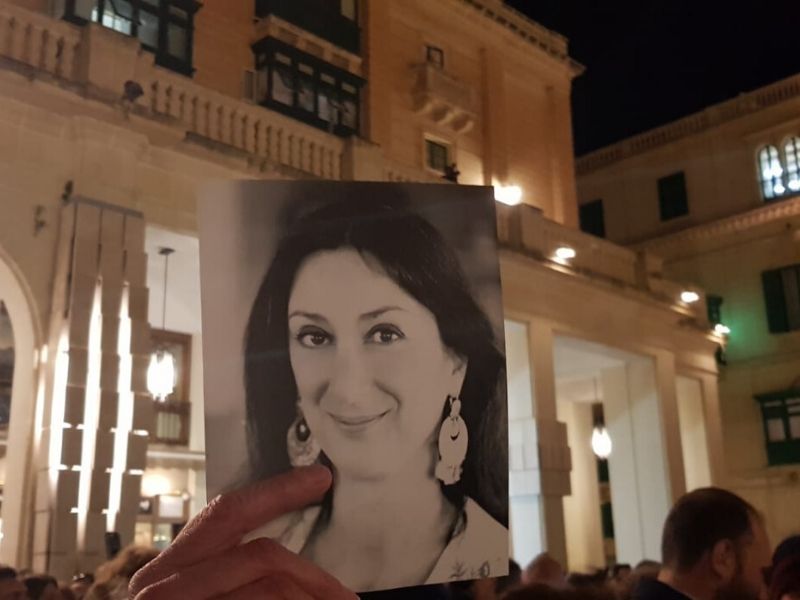The strategic lawsuits and libels filed against murdered journalist Daphne Caruana Galizia by politicians and businessmen were described by her son Matthew as a “never-ending type of torture”, and left the family with no choice but to continue these battles even after her death.
Speaking during a Greenpeace panel discussion on Strategic Lawsuits Against Public Participation (SLAPP) in Amsterdam and organised by Greenpeace with the participation of major international organisations, Caruana Galizia gave the audience a closer look at the fight his mother faced right up until she was killed.
“It seemed as though a constellation of interests around a key group of government figures had formed to make my mother’s life impossible,” Caruana Galizia said.
The journalist had over 40 libel cases filed against her, making her life “absolutely impossible” right up until the day she was murdered, her son said. Her bank accounts were frozen and she spent the majority of her time with her lawyers or turning up for sittings.
"it made her life impossible up until she was murdered…there seemed no end to it" @mcaruanagalizia talks about the 50+ defamation actions brought against his mother, the assassinated Maltese journalist, #DaphneCaruanaGalizia
— Scottish PEN (@ScottishPEN) February 24, 2020
He described the situation as “endless” because the number of cases kept on increasing. “They kept turning up the heat on her. In almost all of the cases, they were politicians or business associates – people who donated money or had some economic interest in a licence or property deal with the government”.
Often enough, the main reason behind the suits was revenge from the subjects of this mother’s articles – who were mainly men. “We have this combination of really serious corruption with a misogynistic culture in Malta. So many times, they wouldn’t actually contradict (her articles) but they would file for damages”.
The Shift also faced threats of SLAPP lawsuits from Henley and Partners and a Russian banker demanding that stories are taken down. The Shift refused and published the threats received.
“This is the strategy in SLAPP – to isolate people so that its only one crazy person saying something about a company. This makes it harder for others to do the same as they wouldn’t want to suffer in the same way,” Matthew said.
#SLAPPs are particularly important in #France, #Croatia, #Italy @FnsiSocial @SNJ_national @SnjCgt @HNDhr @Sindikatnovinar #Belgium #Sweden are doing quite good:
1. legislations prevent it @ajpjournalistes @vvjournalisten
2. there is an anti-slapp culture @journalistforb— EFJ (@EFJEUROPE) February 25, 2020
The family are still fighting the civil cases, as otherwise, they would have ended up losing everything by default.
He was asked by Sarah Clarke, Head of Article 19, who was moderating the discussion whether the resignation of former prime minister Joseph Muscat impacted the pending cases against his mother.
“There is a huge amount of reluctance to let any pressure off my family. The libel cases are seen as a sort of sword held against us and stopping us from campaigning more fully than we are for justice – the people who file these cases see it as a way of keeping us in check”.
Caruana Galizia pointed out that SLAPP suits formed part of a wider strategy and referred to the case of now-closed Pilatus Bank that had opened a case against his mother. After the murder, it had become clear that the libel case was filed to distract the scrutiny the bank was facing from the regulators.
In fact, SLAPP lawsuits are being used around the world to target journalists, freelancers and, NGOs and media activists. Earlier this month, 27 international organisations wrote to European Commissioner Vice President Věra Jourová calling on her to include everyone who has been impacted by SLAPP lawsuits in the European Union’s proposed new rules.
Last week, Maltese blogger Manuel Delia said he was facing a SLAPP lawsuit from the Bulgarian owner of Maltese Satabank who filed it in a Bulgarian court over a blog post where Delia said he regretted removing an earlier post reporting on allegations of money laundering at Satabank.
Satabank has been in administration since 2018 and, last year was hit with €3 million fine by the Financial Intelligence Analysis Unit for breaching anti-money laundering laws – a fact that was highlighted by European Parliament Quaestor David Casa in a tweet.
The fact that a bank riddled with money laundering claims + forced to shut down can sue journalists for writing about them is exactly why I have been demanding a solution to #SLAPP.
These intimidation tactics have no place in society @Manwel_Delia @VeraJourova @AzzopardiJason pic.twitter.com/Xf81j9Ui7n
— David Casa (@DavidCasaMEP) February 23, 2020
Journalist Carole Cadwalladr, who exposed the Cambridge Analytica data-harvesting scandal, is also facing SLAPP action from the British co-founder of the Leave.EU campaign Arron Banks. He is refusing to drop the final two SLAPP lawsuits against the journalist who launched a crowdfunding campaign to cover the massive legal costs.
Human rights lawyer Caoilfhionn Gallagher QC, who also sat on the panel, said the key denominator to SLAPP suits was “weaponising the law” where an individual or company turned the law into a weapon, to silence, to stifle, intimidate or gag those who wish to speak out.
“There are a few people, like Daphne, who won’t be silenced. But they are the tip of the iceberg as the vast majority cave when they get a threatening letter – they take the story down and they are silenced”.
Gallagher said tackling SLAPP was a huge issue and the response of the law was also very important. “If these actions go unchecked like in Malta then it sends a message that the target is fair game and contributes to the sense of impunity”.












